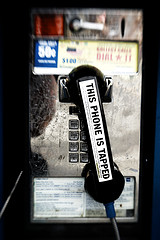 Upon review of the cases on which the State relies, the Court finds no support for the proposition that the general public is aware that a call made by a civilian on an outgoing line can be recorded without notice, or that a call that cannot be overheard by an officer through natural means loses a reasonable expectation of privacy because of a nonconsensual recording on a police line.
Upon review of the cases on which the State relies, the Court finds no support for the proposition that the general public is aware that a call made by a civilian on an outgoing line can be recorded without notice, or that a call that cannot be overheard by an officer through natural means loses a reasonable expectation of privacy because of a nonconsensual recording on a police line.
In this case, no police officer heard through the use of the naked ear either side of the conversation. The surreptitiously recorded conversation in this case does not fall within the ambit of the so-called “plain hearing” exception to the warrant requirement. And the holding in State v. Jackson that the defendant-inmates had no reasonable expectation of privacy in their calls was premised on two critical factors: the correctional facilities’ legitimate security interests and the notice given to inmates that their calls might be recorded and monitored. See 460 N.J. Super. 258, 276 (App. Div. 2019), aff’d, 241 N.J. 547 (2020).
The Court concludes that, under Article I, Paragraph 7 of the New Jersey Constitution, an arrestee has a reasonable expectation of privacy in a call made from a police station in the absence of notice that the conversation may be monitored or recorded.
First, police monitoring of telephone conversations — without consent, a warrant, or other appropriate judicial authorization — empowers the government to arbitrarily peer into the most private sanctums of people’s lives in violation of the privacy protections afforded by Article I, Paragraph 7. Second, the State has provided no factual support and scant judicial authority for the notion that New Jersey’s residents have a widespread understanding that all outgoing telephone calls from a police station are recorded. Third, requiring notice of recording does not undermine and may enhance institutional security and public safety by deterring the unlawful use of the stationhouse line. In hindsight, the better lie for the police to have told at the suppression hearing would have been that they overheard the conversation at issue with the naked ear. That claim may have been undermined by the actual recording that depicted muffled whispering. Destroying that recording might have been considered too bold and unlawful under the circumstances.
